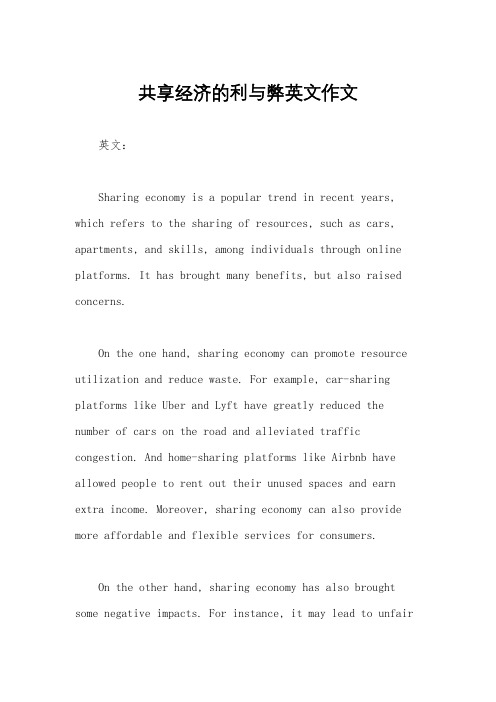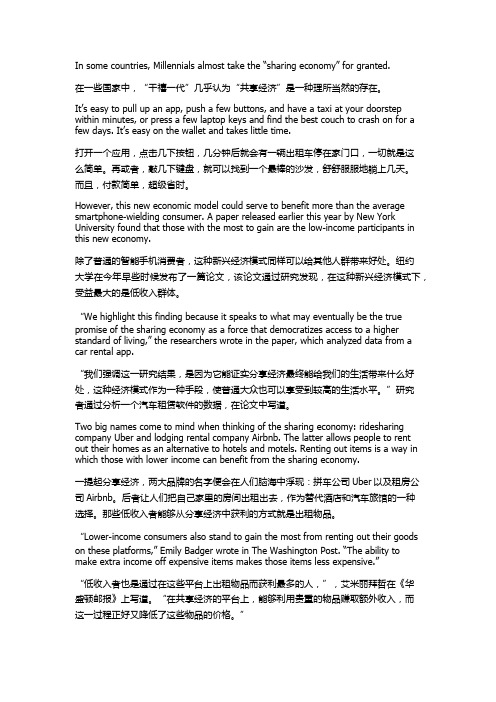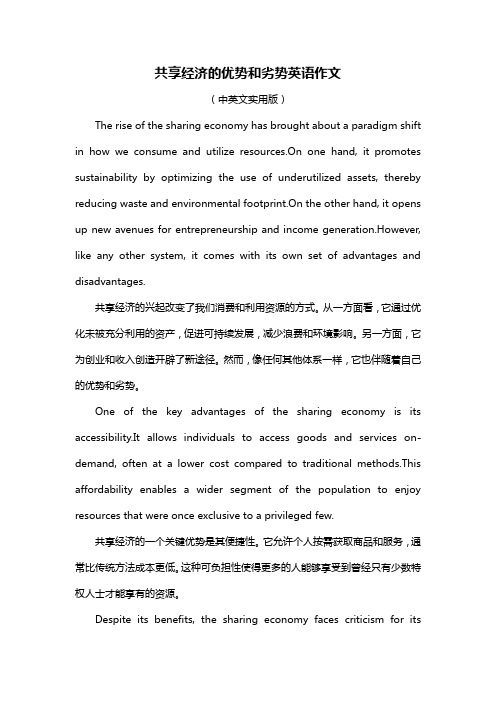共享经济的好处和坏处 英文PPT模板
共享经济的好处和坏处英语作文

共享经济的好处和坏处英语作文如下:Title: The Pros and Cons of the Sharing EconomyIn recent years, the sharing economy has revolutionized how people access and utilize resources. While it offers numerous benefits, such as convenience and cost-effectiveness, it also presents drawbacks, including regulatory challenges and quality concerns.One of the primary advantages of the sharing economy is the increased accessibility it provides. Through platforms like Airbnb and Uber, individuals can easily rent accommodations or transportation services at a fraction of the traditional cost. This not only makes travel more affordable for consumers but also allows homeowners and car owners to monetize their assets. Additionally, the sharing economy fosters community connections and promotes sustainability by encouraging the reuse of existing resources.However, the sharing economy also poses several challenges. One major concern is the lack of regulation, which can lead to safety and security risks. For instance, there have been reports of Airbnb listings being used for illicit activities, and incidents of rideshare drivers engaging in dangerous behavior. Furthermore, the gig-based nature of sharing economy jobs often means that workers lack access to traditional employment benefits such as healthcare and retirement plans.Another downside is the potential for exploitation. Some argue that platforms take advantage of their workers by paying them less than minimum wage while still requiring them to cover expenses like fuel and car maintenance. This creates a precarious financial situation for those who rely on these platforms as their primary source of income.In conclusion, while the sharing economy offers numerous benefits, it is essential to address its drawbacks through proper regulation and support for workers. By balancing the pros and cons, we can ensure that this innovative economic model continues to thrive while protecting the rights and well-being of all partiesinvolved.。
共享经济的好处和局限性英语作文

共享经济的好处和局限性英语作文The Benefits and Limitations of the Sharing EconomyThe sharing economy, also known as collaborative consumption, is a socio-economic system built on the sharing of resources. It involves the sharing of goods and services among individuals, often facilitated by technology platforms. While the sharing economy has gained popularity in recent years, it has both benefits and limitations that need to be considered.Benefits of the Sharing Economy:1. Cost savings: One of the primary benefits of the sharing economy is cost savings. By sharing resources such as cars, homes, and equipment with others, individuals can reduce their expenses significantly. This can be particularly useful for those on a tight budget or looking to save money.2. Environmental impact: The sharing economy can also havea positive impact on the environment by reducing waste and promoting sustainability. By sharing resources instead of buying new ones, less waste is produced, and fewer resources are consumed, which can help to reduce the carbon footprint.3. Increased access: The sharing economy provides individuals with access to goods and services that they may nothave been able to afford otherwise. This can be especially beneficial for those in underserved communities or with limited financial means, as it can provide them with access to essential resources.4. Social connections: The sharing economy can help to build social connections and foster a sense of community. By sharing resources with others, individuals can form relationships and partnerships that can lead to mutual benefit and support.Limitations of the Sharing Economy:1. Quality control: One of the limitations of the sharing economy is the lack of quality control. Since shared goods and services are often owned and maintained by individuals, there is a risk of receiving low-quality or subpar items. This can impact the overall experience and satisfaction of users.2. Regulation: The sharing economy operates in a largely unregulated space, which can lead to issues related to safety, liability, and accountability. Without proper regulations in place, there is a risk of exploitation, fraud, and legal disputes.3. Privacy concerns: The sharing economy relies heavily on the use of technology platforms to facilitate transactions, which can raise privacy concerns. Personal information and data areoften shared with third-party providers, raising questions about data security and protection.4. Inequality: The sharing economy has been criticized for exacerbating existing social and economic inequalities. While it can provide access to resources for some, it may also exclude others who do not have the means or ability to participate in the sharing economy.In conclusion, the sharing economy has the potential to bring about positive change by promoting collaboration, sustainability, and financial savings. However, it also presents challenges related to quality control, regulation, privacy, and inequality that need to be addressed. By recognizing and addressing these limitations, the sharing economy can continue to evolve and thrive as a viable alternative to traditional consumption models.。
共享经济的利与弊英文作文

共享经济的利与弊英文作文英文:Sharing economy is a popular trend in recent years, which refers to the sharing of resources, such as cars, apartments, and skills, among individuals through online platforms. It has brought many benefits, but also raised concerns.On the one hand, sharing economy can promote resource utilization and reduce waste. For example, car-sharing platforms like Uber and Lyft have greatly reduced the number of cars on the road and alleviated traffic congestion. And home-sharing platforms like Airbnb have allowed people to rent out their unused spaces and earn extra income. Moreover, sharing economy can also provide more affordable and flexible services for consumers.On the other hand, sharing economy has also brought some negative impacts. For instance, it may lead to unfaircompetition and tax evasion. Some sharing economy platforms do not comply with regulations and do not pay taxes, which may harm the interests of traditional businesses and the government. Additionally, sharing economy may also raise privacy and security concerns, as people need to sharetheir personal information and belongings with strangers.In my opinion, sharing economy is a double-edged sword. It can bring many benefits, but also pose challenges and risks. Therefore, we need to strike a balance between innovation and regulation, and ensure that sharing economy operates in a fair and responsible manner.中文:共享经济是近年来的一个流行趋势,它指的是通过在线平台在个人之间共享资源,如汽车、公寓和技能。
共享经济的好处 The benefits of sharing

In some countries, Millennials almost take the “sharing economy” for granted.在一些国家中,“千禧一代”几乎认为“共享经济”是一种理所当然的存在。
It’s easy to pull up an app, push a few buttons, and have a taxi at your doorstep within minutes, or press a few laptop keys and find the best couch to crash on for a few days. It’s easy on the wallet and takes little time.打开一个应用,点击几下按钮,几分钟后就会有一辆出租车停在家门口,一切就是这么简单。
再或者,敲几下键盘,就可以找到一个最棒的沙发,舒舒服服地躺上几天。
而且,付款简单,超级省时。
However, this new economic model could serve to benefit more than the average smartphone-wielding consumer. A paper released earlier this year by New York University found that those with the most to gain are the low-income participants in this new economy.除了普通的智能手机消费者,这种新兴经济模式同样可以给其他人群带来好处。
纽约大学在今年早些时候发布了一篇论文,该论文通过研究发现,在这种新兴经济模式下,受益最大的是低收入群体。
“We highlight this finding because it speaks to what may eventually be the true promise of the sharing economy as a force that democratizes access to a higher standard of living,” th e researchers wrote in the paper, which analyzed data from a car rental app.“我们强调这一研究结果,是因为它能证实分享经济最终能给我们的生活带来什么好处,这种经济模式作为一种手段,使普通大众也可以享受到较高的生活水平。
共享经济的优势和劣势英语作文

共享经济的优势和劣势英语作文(中英文实用版)The rise of the sharing economy has brought about a paradigm shift in how we consume and utilize resources.On one hand, it promotes sustainability by optimizing the use of underutilized assets, thereby reducing waste and environmental footprint.On the other hand, it opens up new avenues for entrepreneurship and income generation.However, like any other system, it comes with its own set of advantages and disadvantages.共享经济的兴起改变了我们消费和利用资源的方式。
从一方面看,它通过优化未被充分利用的资产,促进可持续发展,减少浪费和环境影响。
另一方面,它为创业和收入创造开辟了新途径。
然而,像任何其他体系一样,它也伴随着自己的优势和劣势。
One of the key advantages of the sharing economy is its accessibility.It allows individuals to access goods and services on-demand, often at a lower cost compared to traditional methods.This affordability enables a wider segment of the population to enjoy resources that were once exclusive to a privileged few.共享经济的一个关键优势是其便捷性。
关于共享经济的英语词汇PPT模板

如何去掉嵌入字体? 和地对我说:;没关系,你先去写作业,写完后叫我。2、;我找看到到妈”妈选没;请项客”;让,单我吃击;竹笋烧肉;,便长吁
旅行与住宿的共享经济典型代表
典型代表之——途家网
途家网成立于2011年12月,是一家高品质的中 高端度假公寓在线预订平台公司,提供国内旅游 地度假公寓的在线搜索、查询和交易服务。
途家网的核心商业逻辑是将业主闲置的房产盘活, 通过一定的运营管理为用户提供物美价廉的住房, 为业主创造额外收入,同时为自己赚得利润。
1 共享经济的概念/The concept of sharing economy
“共享”是“协 同消费
商业模式: “个 人对个人交易”
基本 概念
基本理念:“使用所有权”
本质在于:沟通成为一 种巨大的生产力
1 共享经济的概念/The concept of sharing economy
共享经济本质-共享经济的发展是一个去中介化和再中介化的过程
共享经济的本质是通过整合线下的闲散物品 或服务者,让他们以较低的价格提供产品或 服务。对于供给方来说,通过在特定时间内 让渡物品的使用权或提供服务,来获得一定 的金钱回报;对需求方而言,不直接拥有物 品的所有权,而是通过租、借等共享的方式 使用物品。
1 共享经济的概念/The concept of sharing economy
PPT幻灯片 感动是泌人心脾的甘泉,感动是熏人欲醉的暖风,记忆中那些美丽的一瞬,就像一些飘不落的日子,
在我脑海里萦绕,在脑海里闪现。感动像水一样顺1着、掌找心到的纹顶路部滑的入心工田具。栏那天,,点我击走在插回入家。的路
共享经济利弊英语辩论PPT模板
1
共享经济的概念
添加节标题
添加节标题
添加节标题
添加节标题
共享经济的概念
基本概念
狭义来讲,是指以获得一定报酬为主要目的,基于陌生人且存在物品使用权暂时转移的一种商业模式。
利用移动互联网技术将闲置或未充分利用的资源等就近向需求者 提供及时服务,互联网平台对供需进行资源组织和调度管理,形成事 实上的产品品牌。
需求方
供给方
共享经济平台
共享经济的概念
2020/3/31
基本概念
观念
“共享”是“协 同消 费”
理念
基本理念:“使用所有 权”
模式
商业模式: “个人对 个人交易”
本质
本质在于:沟通成为一 种巨大的生产力
7
共享经济的概念
闲置的资源
供给方从商业组织演变为线下 的个体劳动者。因此,需要有 一个平台对数量庞大的需求方 和供给方进行撮合。因此就产
她见
3、找到图片来源,找到本地文件并点击上传。
了,立刻跑回家,拿了一张创可贴,给我贴好。我第1一、次单发击现这“个文男件孩子”气。作文的女孩变得细心起
来;;这是朋友对我的爱。而张老师,视我们全班同学为儿女一样,耐心地教导我们;;这是老师对我的 爱。很多人都觉得爱很难找,可其实爱无处不在!虽然我们时刻能感受到周围人的爱,那你会回报
18
4
生活中的共享经济
添加节标题
添加节标题
添加节标题
添加节标题
生活中的共享经济
2020/3/31
服饰共享
RenttheRunway:少买衣服多租 衣服 PoshMark:二手服装交易平台
20
生活中的共享经济
共享经济的利弊英语作文
The sharing economy has been gaining traction throughout the world and is seen as an innovative way to solve modern economic problems. It is defined as an economic model in which individuals, companies and organizations share their resources, labor and products in order to increase efficiency and reduce costs.The sharing economy has a number of benefits. It creates new job opportunities, particularly for those who can't find a full-time job. It also encourages collaboration and creativity, as some people can use their skills to create something new. Furthermore, it can reduce waste and conserve resources, as resources are shared instead of being used up.However, the sharing economy also has its drawbacks. It can lead to an increase in inequality, as those with more money can access better services and resources. It can also lead to a decrease in wages, as people often work for lower pay in the sharing economy. Additionally, it can be difficult to regulate, as it is not based on traditional economic models.In conclusion, the sharing economy has both advantages and disadvantages. It has created new job opportunities and encouraged collaboration and creativity, but it has also led to an increase in inequality and a decrease in wages. With careful regulation, the sharing economy can be a positive force for economic growth.。
共享经济的好处和局限性英语作文
共享经济的好处与局限性The rise of the sharing economy has transformed the way we consume goods and services, offering numerous benefits but also posing certain limitations. This essay aims to explore both sides of this phenomenon, highlighting its advantages and addressing its challenges.Firstly, the sharing economy has brought about significant environmental benefits. By enabling individuals to rent or share resources instead of owning them, it has reduced the need for personal vehicle ownership, thus cutting down on carbon emissions and traffic congestion. Additionally, the sharing of items like clothes, electronics, and even housing helps reduce waste and promotes sustainability. This not only benefits the planet but also saves individuals money in the long run.Furthermore, the sharing economy has provided an opportunity for people to generate additional income. Many individuals have capitalized on platforms like Uber and Airbnb to rent out their cars or homes, earning a side income that can significantly contribute to their financial well-being. This flexibility allows them to maintain theirregular jobs or pursue other passions while still generating additional revenue.Moreover, the sharing economy has fostered a sense of community and connectivity. Through platforms that connect people with shared interests or needs, it has enabled individuals to meet new people, form relationships, and engage in collaborative projects. This aspect of the sharing economy not only enhances social interaction but also contributes to a more inclusive and interconnected society.However, despite these benefits, the sharing economy also has its limitations. One significant challenge is the issue of regulation. As the sharing economy continues to grow and evolve, it has become increasingly difficult for governments and regulatory bodies to keep up with the pace of change. This has led to a regulatory vacuum in some areas, allowing unethical or illegal practices to thrive. Additionally, the sharing economy can sometimes lead to displacement and income inequality. While some individuals may benefit from the ability to generate additional income through sharing platforms, others may find theirlivelihoods threatened by the competition from these platforms. For instance, traditional taxi drivers or hotel owners may face increased competition from Uber and Airbnb, potentially leading to job losses or reduced earnings.Furthermore, the sharing economy can also pose privacy and security concerns. As individuals share their personal information and belongings through these platforms, they may be exposed to risks of data breaches or theft. The lack of standardization and regulation in the sharing economy can make it difficult to ensure the safety and privacy of users.In conclusion, the sharing economy offers numerous benefits, including environmental sustainability, financial opportunities, and community building. However, it also poses challenges in terms of regulation, displacement, and privacy concerns. As the sharing economy continues to evolve, it is crucial for governments, businesses, and individuals to work together to address these challenges and ensure that the benefits of the sharing economy are shared by all.**共享经济的好处与局限性**共享经济的崛起已经改变了我们消费商品和服务的方式,带来了诸多好处,但同时也存在一些局限性。
共享经济的坏处英语作文
共享经济的坏处英语作文The Disadvantages of the Sharing Economy。
In recent years, the sharing economy has gained significant popularity worldwide. It refers to the economic system where individuals can share resources, such as accommodation, transportation, or even skills, through online platforms. While the sharing economy has its advantages, it also comes with several drawbacks that need to be considered.One of the main disadvantages of the sharing economy is the lack of regulations and legal protections. Unlike traditional businesses, sharing economy platforms often operate in a gray area, where rules and regulations are not well-defined. This lack of oversight can lead to various issues, such as safety concerns and unfair competition. For example, in the accommodation-sharing sector, there have been cases of hosts renting out unsafe or unhygienic properties, putting the health and well-being of guests at risk. Additionally, the absence of regulations allows some participants to evade taxes, which can have negative consequences for the overall economy.Another downside of the sharing economy is the potential for exploitation. While the concept of sharing resources may seem altruistic, it can also create opportunities for individuals to take advantage of others. For instance, in the gig economy, where people offer their services on a freelance basis, workers often face low pay, long hours, and lack of job security. They may be forced to accept unfavorable conditions due to the intense competition and the absence of worker protections. Moreover, some sharing economy platforms have been criticized for their opaque rating systems, which can result in unfair treatment and discrimination.Furthermore, the sharing economy can exacerbate income inequality. Although it promises to provide opportunities for individuals to earn extra income, it often benefits those who already have resources and assets. For example, in the ride-sharing industry, individuals who own cars can easily participate and earn money, while those who cannotafford a vehicle are excluded. This further widens the wealth gap and limits the potential benefits of the sharing economy to a select few.Additionally, the sharing economy can negatively impact traditional industries and local communities. As sharing platforms gain popularity, they often disrupt established businesses and lead to job losses. For example, the rise of home-sharing platforms has affected the hotel industry, with many hotels experiencing a decline in bookings. This can have a ripple effect on the local economy, as businesses dependent on the tourism industry suffer. Moreover, the rapid growth of sharing economy platforms can result in overcrowding and strain on local resources, such as transportation infrastructure and public spaces.In conclusion, while the sharing economy has its merits, it is crucial to recognize its drawbacks. The lack of regulations, potential for exploitation, exacerbation of income inequality, and negative impact on traditional industries and local communities are significant concerns. As the sharing economy continues to evolve, it is essential to address these issues and find ways to strike a balance between innovation and ensuring a fair and sustainable economic system for all.。
- 1、下载文档前请自行甄别文档内容的完整性,平台不提供额外的编辑、内容补充、找答案等附加服务。
- 2、"仅部分预览"的文档,不可在线预览部分如存在完整性等问题,可反馈申请退款(可完整预览的文档不适用该条件!)。
- 3、如文档侵犯您的权益,请联系客服反馈,我们会尽快为您处理(人工客服工作时间:9:00-18:30)。
利用移动互联网技术将闲置或未充分利用的资源等就近向需求者提供及时服务,互联网平台 对供需进行资源组织和调度管理,形成事实上的产品品牌,在法律上则以平台服务供应方, 个人以独立承包商身份向需求方提供服务,平台收取服务佣金。
基本概念
观念
“共享”是协同消费
理念
使用所有权
模式
个人对个人交易
本质
沟通成为一种巨大的生产力
一个去中介化和再中介化的过程
01
02
03
闲置的资源 利益最大化 强大整合力
供给方从商业组织演变为线下的个体劳 动者。因此,需要有一个平台对数量庞 大的需求方和供给方进行撮合。因此就
产生了共享经济的平台公司。
与传统的酒店业、汽车租赁业不同,这 些平台型的互联网企业利用移动设备、 评价系统、支付、LBS等技术手段有效的 将需求方和供给方进行最优匹配,达到
模式分析
以移动程序链接乘客和司机 打破物权概念 不增加汽车存量 资源分配更合理
影响力
连锁效应
一辆用于共享的汽车,将会减少8-9辆汽车的销售。这对于汽车制造商、 销售商、保险公司来说,会产生连锁的影响。
拼车计划
未来动态
乘客一下车
乘客二下车
乘客二上车
乘客一上车
成功案例
途家网
途家网成立于2011年12月,是一家高品质的中高端度假公寓在线预订平台公司,提供国内旅 游地度假公寓的在线搜索、查询和交易服务。
的杂货送上门。
餐饮行业
妈妈拉着我的去了我的书房,我边走边哭。来到书1房、,找我到一点顶也部没的有往工常具的栏兴奋,,点站击在门插口入,。脑子
怎么插入图片? 里一片空白。看着妈妈一个人搭完了两个跨栏,一红一蓝,比电视里看到的要低。;难道我们要做游
戏声吗问?我:;我;小用牛略,带你沙会哑用的什声么音方问法妈过妈去。呢妈?妈没;;有当马然2上是、回跨答过单,去击搀了着!图我;片我的回。一答只道小。手;,好带呀我来到栏杆前,轻
双方收益的最大化。
对于供给方来说,通过在特定时间内让 渡物品的使用权或提供服务,来获得一 定的金钱回报;对需求方而言,不直接 拥有物品的所有权,而是通过租、借等
共享的方式使用物品。
共享经济的优势
优势分析
能力释放 重塑标准
去中介化的过程伴随着前端供给能力快速释放,为产品和服务的供给 带来非标准化的可能性。在共享经济的平台下,供给端的创造力被激 发,他们更倾向于提供非标准化的产品和服务,以形成个人产品独特 的品牌。
4、右下角找到取消嵌入文字选项。
共享经济的概念
基本概念
三大主体
共享经济”从狭义来讲,是指以获得一定报酬为主要目的,基于陌生人且存在物品使用权暂 时转移的一种商业模式。这其中主要存在三大主体:商品或服务的需求方、供给方和共享经 济平台。共享经济平台作为移动互联网的产物,通过移动LBS应用、动态算法与定价、双方互 评体系等一系列机制的建立,使得供给与需求方通过共享经济平台进行交易。
如何去掉嵌入字体? 妈相信你一定能跨过去的。妈妈让你学钢琴,是希望2你、长找大到了,”有选一项天,”你,单会明击白,就算妈妈不在
你身边,但你感觉妈妈就像坐在你旁边的凳子上听你弹琴。有一天,当你遇到困难时,你可以弹一
首为你什最么喜,欢第的二曲天子我放很松顺自利己地。就有把一《天三,个你瞎可老以鼠用》音弹乐了3来下、鼓来单励。击自直己到保。今存天;我。,点妈点妈头从,来似没乎强明迫白我了去。不知道
共享经济
汇报人:某某某
CONTENT
,不急,作文小牛再来一次。;妈妈拍拍我的肩,笑眯眯地对我说。试了一遍又一遍,还是不行。我 从原先的抽抽噎噎变成了泣不成声,哭得浑身打颤。这三个瞎老鼠实在是太讨厌了,这是谁编的,
PPT幻灯片 这么难听的名字,这么难弹的曲子啊!;小牛,别着急,让我们去拿乐高的材料去搭一样东西吧。;
优势分析
整合线下资源
将线下闲置资源聚合到平台上,通过LBS定位技术、算 法,将平台上需要用户进行匹配。从而达到对线下资 源整合的目的。
提供非标产品
以Uber为代表的打车平台。在供给方和需求方个性化需 求提出后,共享经济平台为他们提供了自由匹配的可能 性:平台将所有乘客的用车信息推送到每个司机手机上, 供司机选择合适的乘客。
家政行业
通过 Handybook 的在线服务预订保 洁员和清洁工。而这些保洁员和清洁
工可以利用碎片化时间来工作。
添加您的主标题
健身房
ClassPass 把纽约所有不错的健身房连 接起来,你只需要购买 ClassPass 会acart网站或移动应用下订单, 几个小时后Instacart就会将他们购买
3、找到图片来源,找到本地文件并点击上传。
,让我们来试试吧。;我抬起小腿和妈妈一起跨过了1栏、杆单。;击你看“,文眼件前的”这。个栏杆,当你抬起双脚
时,你成功地跨越了过去。妈妈想要告诉你,今后,你会遇到很多困难,每一个困难都需要依靠你 自己的勇气和力量去战胜它。回头看一看吧,第一个栏杆你不也跨过去了吗?弹钢琴也是这样,妈
商业逻辑
将业主闲置的房产盘活,通过 一定的运营管理为用户提供物 美价廉的住房,为业主创造额 外收入,同时为自己赚得利润
生活中的共享经济
未来趋势
车位共享
在你的私人或公司停车位闲置时,通 过Cityfyd设定停车位闲置时间,共享
给需要的人。
服饰共享
RenttheRunway:少买衣服多租衣服 PoshMark:二手服装交易平台
共享经济成功案例
成功案例
Uber
Uber提供私家车搭乘服务。主要运作模式是司机拿出自己的时间与汽车,在uber登记上线, 当附近有人叫车时,uber就近将任务派发给司机。
发展历程
2009.03
总部旧金山成立
2014.07
正式宣布进军北京
2017
与神舟专车、滴滴打车竞争白热化
2014.08
“人民优步”上线,年底估值400亿美元
提升配置效率
共享经济的出现,降低了供给和需求两方的成本,大大 提升了资源对接和配置的效率。这不仅体现在金钱成本 上,还体现在时间成本上。
树立个人品牌
供给方庞大的商业组织中,被忽视的能力和才华,可以 通过共享经济平台得到进一步的发掘。而通过他们提供 的优质、个性化的服务,他们更获得了比在商业组织内 更大的成就感、知名度。
